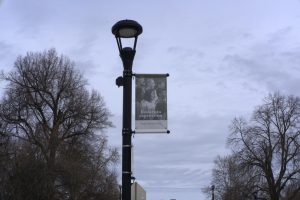New Student Interns Confront Campus Sexual Violence
October 28, 2015
Barbara Maxwell, the Associate Dean of Students and Student Life, has hired six student interns to work on the issue of sexual violence prevention on campus. The interns, who started working at the beginning of the semester, have different focuses, from Greek life to first-year students to multimedia campaigns.
This group differs from existing student organizations, such as All Students for Consent (ASC), Feminists Advocating for Change and Empowerment (FACE) and Greek anti-sexual violence coalitions. Maxwell is adamant that the interns’ projects be seen as student-driven, and not part of a larger organization.
“I don’t want us to necessarily own these activities, my hope is that these 5 or 6 students are out here making a difference, empowering students,” said Maxwell, “I want everyone to feel like they’re a part of this effort.”
Sophomore Catherine Fisher is one of Barbara’s interns. She is responsible for the programming around issues of sexual violence prevention; she also acts as a liaison between ASC, FACE and Maxwell.
“What we don’t want to do is be stepping on each other’s toes and duplicating each others’ efforts,” said Fisher.
Although Maxwell is working to avoid overlapping projects, Fisher is motivated by the commonalities that she sees.
“The more people working on the issue of preventing sexual assault, the better,” said Fisher, “I’m kind of focused on always doing more, not kind of saying ‘we’ve done enough’…There’s always more to be done, it’s not a process that ends.”
Beyond the efforts of Maxwell’s interns, which include designing Reid coffee sleeves listing the signs of Intimate Partner Violence and organizing tours of the fraternities for new sorority members, Maxwell is using prior relationships to get the word out. Sigma Chi used an endowed lecture fund to bring Dr. David Lisak, a researcher and expert on non-stranger rapists, to Whitman last Thursday, Oct. 22.
Students who attended the lecture or spoke with Dr. Lisak seemed willing to engage with the topics that he brought up, which included institutional betrayal, rape myths and current efforts to combat sexual violence. Katie Steen, ASWC’s Sexual Misconduct Prevention Advocate, commented on the insight his visit provided.
“Actually, based a little bit on conversations I had with Dr. David Lisak,” said Steen, “I was thinking a lot about how one thing we don’t do a really good job about is creating a culture where perpetrators, especially serial perpetrators, are not allowed to be within the norm.”
Part of the explanation is a certain amount of apathy on campus when it comes to issues of consent and violence prevention.
“Especially to first-year students, it may seem like everyone cares about this issue because you get so much talk about it during orientation,” said Steen, “It’s important that we remember that even with that visibility, there’s still a lot of issues, and we should be thinking about those issues critically on an everyday basis.”
Although consent has been a prevalent topic on campus for the last two years, Maxwell hopes to diversify people’s awareness of sexual violence issues. She believes that Intimate Partner Violence and male victimization are underreported and rarely heard beyond anonymous surveys.
“Based on our statistics, we have more men experiencing either sexual violence or intimate partner violence,” said Maxwell, “but my sense is that there’s a lot of things that keep men from coming forward. And it’s not the policy, and it’s not the reporting process, it’s things like rape myths that exist for men as well as women.”
It is destroying dangerous myths, and the cultures that produce them, that students as well as administrators have made the subject of their mission.
“Even more so that trying to be the police, and find those people we really need to disrupt the culture. And that’s where we maybe aren’t doing a good job, because there are plenty of people who are really educated on consent, and who are really big proponents of this sort of initiative, but then there are also people who just let it happen, and who support their friends and their other peers because they think that they’re really great people, and they don’t really…act in a more critical way,” said Steen.
Key to this process is having students start conversations with each other. Senior Sam Crosby is another one of Barbara’s interns, whose focus on off-campus students has led him to consider how much impact he can have on Whitman’s culture as a whole.
“I feel like there are people who I just can’t reach…you might end up talking to the same people over and over again but some of those people will talk to people that haven’t been talked to before,” said Crosby, “It’s hard because you can’t, as one person, change everything, but still talking to the same people over and over again helps spread it further.”
Maxwell’s interns came onto a well-populated scene of student groups and leaders, who had achieved recognition from the administration and their fellow students. The addition of more voices doesn’t seem to have hurt the cause. If anything, it has increased visibility. There is danger, however, in complacency.
“I think there are some really great things that have happened recently however I think it’s a really problematic thing that many of us think, ‘Well, we do so much about consent, we do so much about sexual violence prevention, therefore it must not be an issue anymore.’ That’s absolutely not true,” said Steen, “[Sexual violence] is definitely an issue on our campus.”







